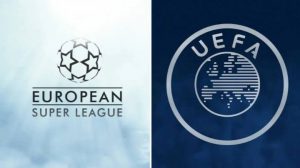By *Eduardo Gracias Baptista and **Shanay Das Guru
Recent days have seen the meteoric rise and fall of the European Super League (ESL). This new league would have consisted of 15 founding clubs and 5 other clubs; the former consisting of ‘big clubs’ which could not be relegated and the latter in clubs who performed well over the past years on a rotational basis. Following the announcement, the proposal was met with severe backlash and most founding clubs withdrew from the competition, marking the ESL’s swift collapse.
Notwithstanding, it is still worth analysing whether it would have been in line with EU competition law. The possible sanctions that would have followed also raise some interesting points. The discussion that follows is based on the ESL, as structured and described in its press release. This analysis shall seek to contribute to the debate on the desirability and lawfulness of future similar leagues and shed some light on the often uncertain and murky waters of EU competition law.

- The Relevant Market
According to a 2003 Commission decision, football clubs are considered undertakings, as defined in Klaus Höfner and Fritz Elser v Macrotron GmbH, and are thus capable of affecting competition in the internal market through their interactions, within the meaning of Article 101(1) TFEU. The analysis on the possible interference of competition, however, must be preceded by the definition of the relevant market, within which the ESL and other leagues could be in competition.
The relevant market is composed of the products which the consumers (football fans) regard as interchangeable. In other words, demand substitutability, concerning the various national and international competitions and the accompanying revenue, plays a key role; if a price increase would cause fans to switch from one competition to another, then this means that they compete in the same market.
- The national and European markets
Firstly, there are markets which arise from the various national leagues of the Member States. Tied with national identity, consumers have a proclivity to prefer games which involve a club from their country. Taken as an example, if the prices of the TV broadcasts of the clubs of a country increased, consumers would not switch to foreign clubs. The existence of the ESL would not affect these national markets because, as stated in their press release, the ‘traditional domestic match calendar which remains at the heart of the club game’ would be preserved; this is because the ESL would consist of midweek fixtures in conjunction with the games of the domestic leagues. This harmonious coexistence is further confirmed by the envisioned ‘solidarity’ payments which would be handed out to national associations.
Secondly, consumers often also watch European football, primarily in the form of the Europa League (EL) and the Champions League (CL). These constitute European markets, not only due to the fact that the schedules do not overlap as much as possible with the national leagues, but also because of the very nature of European football. These leagues were created to meet the need of determining who is the definite and genuine champion of Europe. While loyalty to one’s club can be strong and absolute in the European leagues, it is often observed that the elimination of one’s own club prompts a fan to realign their support to a different club, often of the same nationality. National leagues, on the other hand, are not only a means to qualify for the European spots, but also ends in themselves, to quench the thirst for domestic supremacy over one’s rivals for the much-coveted bragging rights. In this sense, there is a two-tier ‘us versus them’ mentality, firstly among clubs in the domestic leagues and then as a collective of national clubs in the European sphere.
2. The Idiosyncrasies of ‘Big Clubs’ and the new European Market
The 15 founding clubs are meant to be the most marketable, profitable, and prestigious football clubs around Europe and around the world. Their wealth of resources and superlative performance are inextricably linked; over the past 30 years throughout Spain, England, and Italy, only 9 times has the league been won by a club other than the founding clubs of the ESL. Due to the utter magnitude of these clubs, they attract consumers from every corner of the world.
Consumers watch a competition when there is a team with which they feel some sort of affinity and not because of the competition itself. This is not the case, however, for consumers who watch a competition because it is the best product available. Related to this, just as the CL is arguably not in competition with the EL, the same holds true for the ESL in relation to the other leagues. Consumers who feel a high affinity with the teams in the ‘old’ markets would continue to watch it over the ESL, just as consumers who preferred the clubs in the EL watched this competition and not the CL. In the case of consumers who would watch the ESL because of its quality, it cannot reasonably be argued that this is problematic because, following that line of thinking, the Champions League would be equally problematic as regards the EL. In other words, there is an inevitable restriction that must be accepted with the introduction of better competitions. Lastly, the fact that there are 5 spots allocated to clubs based on merit would mean that the ESL would not have a potentially troublesome closed character.
With this in mind, the authors argue that the ESL would be independent from the other markets to an extent sufficient and acceptable as to create a new European market. Therefore, it would not violate Article 101(1) TFEU.
- The turn of the legal tide
Within the last 6 months, there have been two decisions which also discuss the paradigm of the many conflicting interests of sporting authorities. In the International Skating Union (ISU) case, the General Court observed that the ISU fulfils regulatory functions and engages in commercial activity, thereby leading to a conflict of interests that is problematic from a standpoint of competition law. ISU rules actively penalising athletes for taking part in sporting events not authorised by it were held to be in violation of competition law. If one may analogise this to UEFA, upon the announcement of the 12 ESL teams, UEFA threatened to ban participating players from its own competitions, a clear show of its regulatory power. On the other hand, UEFA has a financial interest in maintaining its leagues, having earned an estimated €3.86bn in the 2018/19 season. Although the European Super League in its latest form has been shelved for the time being, it would be interesting to imagine a world where it had gone on. Keeping the public opinion and strong opposing voices aside for a second, if one were to analyse it purely from the standpoint of EU competition law, it is quite likely that the proposed UEFA action of restricting the ESL and banning players from its own leagues would have been found to be in breach of competition rules.
In the German Wrestling League case, the Nuremberg Court of Appeals held that while sporting bodies are not absolutely barred from protecting their own economic interests, excluding athletes merely for taking part in events hosted by rival organisers is a forbidden measure under EU and German antitrust law. The Court referred to the ISU case in quoting that sports federations must not use unfair means in protecting their economic interests.
In the aforementioned cases, the respective sporting authority in question brought up the ‘legitimate objective’ argument in order to justify the ban on players, referring to the need to protect the integrity of the sport under Article 165 TFEU; however, in both cases, it was held to be disproportionate. As we speculate on the possibilities if the ESL had gone ahead as planned, it must be noted that the Commission has been cautious in its response, deferring the matter to relevant arbitration arrangements and national courts. Although long-standing scholarly opinion has been sceptical of the probability of success of such a format as the ESL, the recent shift in case law towards promoting greater autonomy for athletes and breakaway leagues suggests that ESL might have had its day in court if matters so escalated. The ESL would have a strong case against UEFA on the basis of the fact that the latter not only organises the biggest football championships but also enters into contracts to exploit those same competitions commercially, thereby placing UEFA in a compromised position with respect to its regulatory position under Article 101 TFEU. Its regulatory functions must conform to settled case law on the application of Article 102 TFEU, such as in the MOTOE case. Reasoning by analogy, UEFA would be prohibited from distorting competition by favouring competitions that it organises, such as the CL and the EL, to the detriment of other undertakings, such as ESL.

- The ESL paradox
While competition law can be quite surgical in what is and what is not the relevant market for a certain purpose, it is noteworthy to mention that these markets not only cater to humans but are also catered by humans – footballers and countless support staff who bring the game onto our screens and into our lives. And so, while it may be confounding to understand why the ESL has been abandoned if indeed it constitutes a distinct relevant market in and of itself, the picture becomes a little clearer when one considers the immense dependence of the existing football structure on an institution such as UEFA. This may be called the ESL paradox – while it constitutes a relevant market independently due to the unique taste of its consumers, such a relevant market is operated by players who are equally dependent on other relevant markets, such as national leagues, for their careers and interests. Such an interpretation explains why the ESL had to be cancelled despite not being in as much of a legal grey area as it has been made out to be in. This problem needs to be analysed from the other side of the competition law lens since the paradox posed by the ESL is not so much about the relevant market as it is about the dependence of the humans who run it on other relevant markets. For the time being, the backlash and associated risks of carrying on with the ESL are much greater than the estimated benefits. And so, despite not being contrary to EU competition law, the ESL must display deference to its current master, UEFA, at least as presently constituted.
The ESL has for long been a mere theoretical possibility passionately discussed among football enthusiasts, however, the latest attempt has been nothing short of concrete. Although the plan has been abandoned for now, the authors contend that an examination of its compliance with competition law is necessary due to its prospective return in the future; and in this regard, conclude that it does not violate competition law by virtue of having a well-defined independent market of its own. If the ESL is to sink, it will not be by navigating the waters of competition law.
The shift in the status of its existence has been complemented by simultaneous developments in case law which present a much brighter slew of options for the European Super League. Recent decisions highlight that UEFA is more likely to be found in breach of competition law instead of a competing association such as the ESL. Despite constituting a sufficiently distinct market of its own, the ESL finds itself in a paradox marked by great dependence on existing structures. There is nothing more human than this dichotomy between the old and the new; if the ESL is to find itself in a position where its existence is not threatened by a decades-old hierarchy, it must bridge the treacherous gap between the paradigm which presently governs the world of football and the future it envisions for itself.
***
*Eduardo Gracias Baptista: Eduardo Gracias Baptista is a second year European law student at Maastricht University, also taking part in the Faculty of Law’s Honours programme. Eduardo currently holds the position of student researcher to Dr. Biermeyer in the field of Luxembourg corporate law. In the future, Eduardo plans to pursue a career related to EU law.
**Shanay Das Guru: Shanay Das Guru is a second year European law student at Maastricht University. His interests include intellectual property law, human rights, and competition law. Shanay’s legal writing invariably addresses topical problems such as ownership of data collected by COVID-19 apps. Of late, he has been working on a paper advocating for greater international regulation of vaccine distribution as part of his portfolio for the Faculty of Law’s Honours programme.
